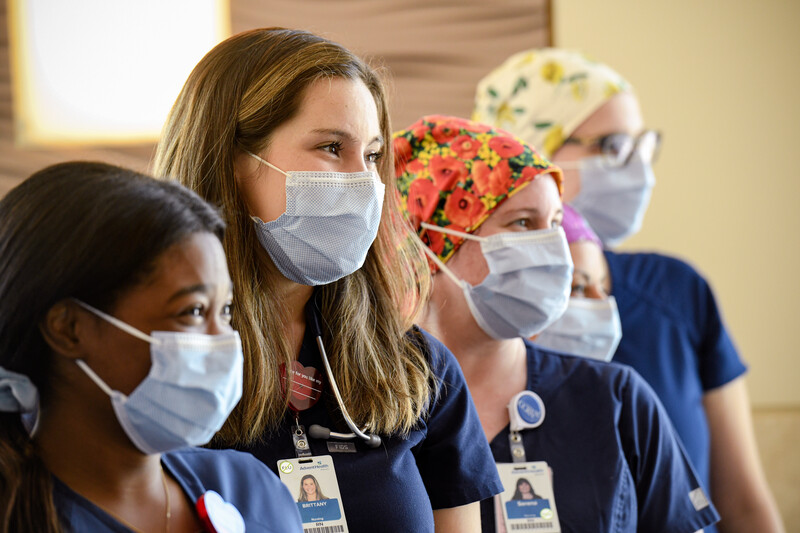The average nurse walks about 16,394 steps a day, according to Healthline. They are on their feet from the moment they arrive on their unit to the moment they end their shift.
In 2020, research results published by Gallup, a global analytics and advice firm, recognized nursing as the most trusted and ethical profession in the United States. Past research results from the same study display a growth in the research responses and not much change in consumer trust in the nursing profession. Nurses truly are incredible.
“I decided to become a nurse because I found the work challenging and my days were always interesting,” said Trish Celano, AdventHealth’s chief nursing executive. “The start of a 12-hour shift sometimes felt like walking onto the stage of a play that had already started. I was not just walking into a patient’s hospital room, but into their entire lives. It was amazing to me that I could go from not knowing someone and then within a few minutes be right there in the middle of their world, which typically was crashing down. I couldn’t help but ask myself, ‘Was there something that patient or family needed that I was going to provide?’”
From the chief nursing executive, to the front-line bedside nurse, AdventHealth nurses at all levels of the organization step into the lives of those they serve, providing whole-person care in body, mind and spirit.
The healing power of compassion
Deb Morrey, a nurse at Centura-Littleton Adventist Hospital, has spent more than 20 years caring for patients. Her time in the emergency department and now in pre-operative/PACU, where patients prepare for and recover from surgery, has proven time and again the importance of stepping into a patient’s shoes to understand what they and their families need—which is often far more than just medicine.
Recently, Deb was preparing a young woman named Sara* for a major surgery when Sara became very upset. Deb had provided a friendly caution about sending text messages while under pre-operative sedatives, and Sara mistakenly thought Deb had tried to take away her phone. The patient’s mother, Carol,* lost her temper.
Deb knew the family was under a lot of stress, and it was important not to take Carol’s words personally. She explained the situation and listened until Carol calmed down; then, feeling like there was more she could do, Deb found Carol in the waiting room, where Carol was also caring for Sara’s 18-month-old daughter. After sitting together for a while, Carol shared with Deb that she had nearly lost Sara in a previous surgery, and this was a very difficult time for her.
“She needed to talk to someone, to have them listen,” Deb said. “Giving her space to share her story was one of the most important things I did for them that day.”
The next day, on her day off, Deb found herself driving back to the hospital to check on Sara and her family. She found Carol and her granddaughter outside the hospital—the toddler restless from being cooped up in a hospital room, and Carol struggling to manage the child due to a recent back injury. Deb helped distract the toddler, quickly eliciting some laughter, and stayed with Sara and her daughter while Carol took a much-needed break.
Centura certainly doesn’t expect nurses to visit patients on their days off, but Deb said she knew there was more she could do for Sara and Carol, and she felt compelled to show them that nurses are more than just a name tag or position—they are fellow human beings, and have empathy for what their patients are going through.
“Caring for patients is what we do, it’s our normal day, but it’s so important for us to remember that these days are not normal for the patients we’re caring for. We’re often seeing them on their worst possible days,” Deb said. “I try to think every single day about what I can do to provide comfort, whether that’s bringing a warm blanket, or holding a hand, or just listening.”
For Anthony Gianatasio, an ICU nurse at Littleton Adventist, caring for people in times of crisis is part of his daily work. One day he noticed that Rosa,* who had recently had a stroke, was attempting to avoid showing any emotion in her face to make her facial paralysis less apparent. As a result, Rosa’s daughter, Liza,* was struggling to communicate with her mother, and was becoming increasingly upset. Anthony quickly struck up a conversation with Rosa and Liza, using humor to lighten the mood and dissolve the tension between mother and daughter.
Liza later wrote to Anthony to thank him for his compassionate care. “We are so grateful for your jokes because it was so great to see my mom smile again,” Liza said. “We will always remember your kindness.”
“As a nurse, I can have a positive impact on my patients and their families no matter what their circumstances,” Anthony said. “The best way I can do that is to value the inherent dignity of every patient and remember that they are, first and foremost, a person.”
*Names have been changed to protect patient privacy.
Caring for our caregivers
No doubt the past year has been a challenge for nurses and other health professionals across the world. Understanding this, Celano stresses the importance of self-care to all her colleagues at AdventHealth as they carry out the important mission of Extending the Healing Ministry of Christ.
“I practice self-care and encourage nurses at AdventHealth to do the same. Personally, I like taking time with my family and doing things that I enjoy, like reading, cooking, camping and fishing,” said Celano. “I dedicate daily devotion time which is fundamental to my spiritual and mental health. At AdventHealth, we encourage nurses to prioritize self-care through proper nutrition, rest and exercise as important components to feel whole.”








